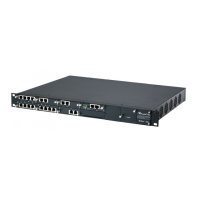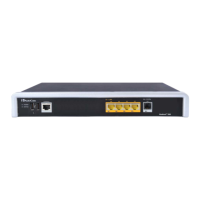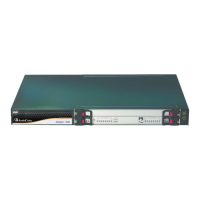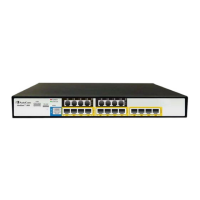User's Manual 932 Document #: LTRT-89730
Mediant 3000
Parameter Description
[0] = Nothing is changed.
[1] = If the device receives RTP packets with a different source
MAC address (than the MAC address of the transmitted RTP
packets), then it sends RTP packets to this MAC address and
removes this IP entry from the device's ARP cache table.
[2] = (Default) The device uses the received GARP packets to
change the MAC address of the transmitted RTP packets.
[3] = Options 1 and 2 are used.
Notes:
For the parameter to take effect, a device reset is required.
If the device is located in a network subnet which is connected
to other gateways using a router that uses Virtual Router
Redundancy Protocol (VRRP) for redundancy, then set the
parameter to 0 or 2.
[EnableMediaUDPChecksum] Enables the device to insert a non-zero UDP layer checksum on
outgoing packets for UDP streams carrying media content (audio
and video).
[0] = (Default) Disable - the outgoing UDP packets carry the
value of 0x00 (i.e., no checksum) in the UDP checksum field of
the UDP header.
[1] = Enable - UDP checksum is added in the outgoing UDP
header.
Note: For the parameter to take effect, a device reset is required.
RTP Base UDP Port
[BaseUDPport]
Global parameter that defines the lower boundary of the UDP port
used for RTP, RTCP (RTP port + 1) and T.38 (RTP port + 2). For
more information on configuring the UDP port range, see
''Configuring RTP Base UDP Port'' on page 215.
The range of possible UDP ports is 6,000 to 64,000. The default
base UDP port is 6000.
Note: For the parameter to take effect, a device reset is required.
[NoOpEnable]
Enables the transmission of RTP or T.38 No-Op packets.
[0] = Disable (default)
[1] = Enable
This mechanism ensures that the NAT binding remains open during
RTP or T.38 silence periods.
[NoOpInterval] Defines the time interval in which RTP or T.38 No-Op packets are
sent in the case of silence (no RTP/T.38 traffic) when No-Op packet
transmission is enabled.
The valid range is 20 to 65,000 msec. The default is 10,000.
Note: To enable No-Op packet transmission, use the NoOpEnable
parameter.
[RTPNoOpPayloadType]
Defines the payload type of No-Op packets.
The valid range is 96 to 127 (for the range of Dynamic RTP
Payload Type for all types of non hard-coded RTP Payload types,
refer to RFC 3551). The default is 120.
Note: When defining the parameter, ensure that it doesn't cause
collision with other payload types.
